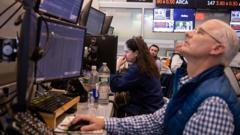US stocks experienced a significant uptick after President Donald Trump declared a suspension of steep tariffs on imports from most countries, opting instead for a 10% import tax. The White House explained that this was a strategic decision to ease negotiations with trading partners, although tariff rates on Chinese goods would increase to at least 125% "effective immediately." This announcement resulted in the S&P 500 climbing an astounding 9.5%, marking the highest single-day increase since 2008, reversing a climate of uncertainty caused by recent tariff implementations.
The market turmoil had already begun with the rollout of a new 46% tariff on goods imported from Vietnam and others, with major drops noted just days before, leading to widespread warnings about an impending recession both domestically and globally. Notably, the S&P 500 saw a decline of over 10% prior to Trump’s announcement, a situation that escalated as investors pulled back on US government bonds amid fears of economic downturn.
Paul Ashworth, chief North American economist at Capital Economics, observed that while Trump managed to stem a stock market rout, the deterioration in the bond market marked an eventual pressure point that led him to reconsider the tariffs. Ashworth anticipates that though robust negotiations between the US and China are necessary, a return to the previously suggested universal 10% tariff is likely, albeit with setbacks in full tariff rollbacks.
Major indices reflected this newfound optimism, with the Dow surging over 7.8% and the Nasdaq jumping approximately 12%. Companies such as Nike and Apple saw substantial increases of 11% and 15%, respectively, contributing to the overall market rebound. However, it noted that the leading indexes remained down from pre-announcement levels, with the S&P 500 off by about 3% and down over 8% year-to-date.
The ongoing tariffs on Chinese imports, which accounted for more than $400 billion in the last year, still loom as a major obstacle for economic recovery. The impact of these tariffs has been significant, particularly for industries reliant on low-cost imports, with predictions indicating a potential 20% drop in shipments handled by US ports this May compared to the previous year.
In his post-announcement commentary, Trump expressed hope of reaching a favorable agreement with China and mentioned the possibility of granting tariff exemptions to individual companies, a marked shift from previous stances. Acknowledging the concerns among business leaders and investors, he reiterated his commitment to maintaining duties on critical sectors, including cars and steel while exploring implications for other industries like pharmaceuticals and lumber.
The sudden policy shift from Trump took many by surprise, especially as Goldman Sachs released a concerning report anticipating a recession due to the tariffs. Shortly after, however, they recalibrated their outlook, citing expectations of minimal growth. Figures such as investor Bill Ackman praised Trump for the move, describing it as a positive step for the American economy amidst escalating tariff anxieties.





















